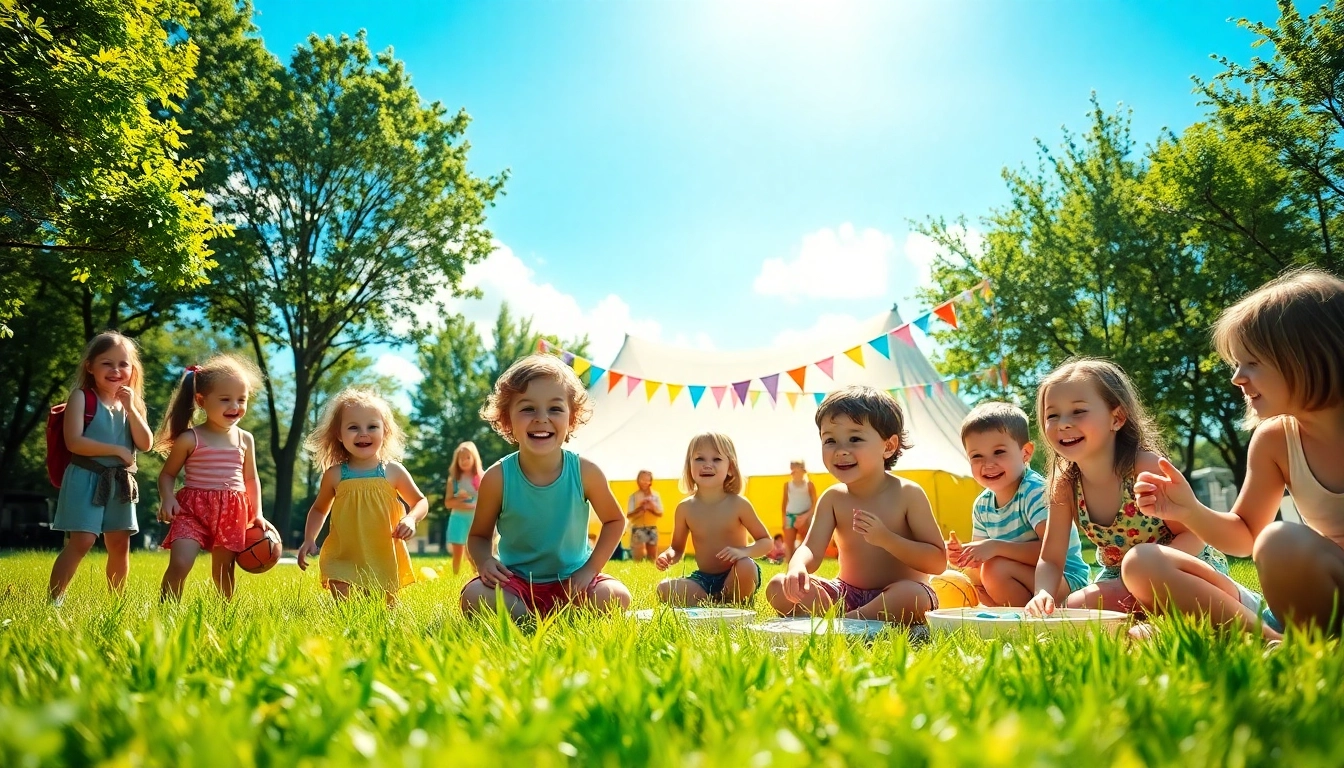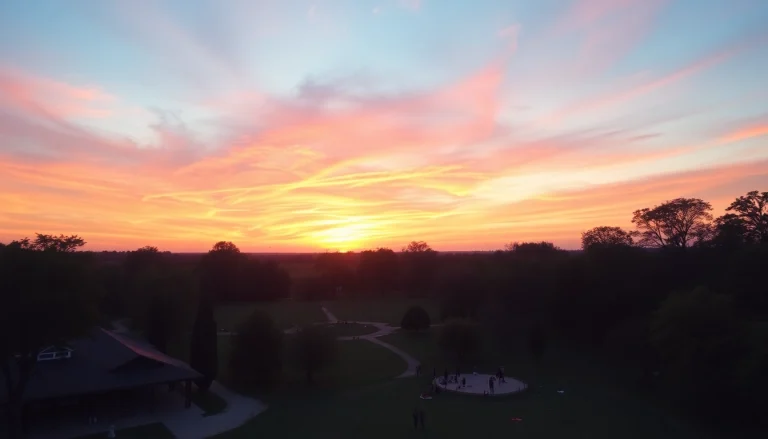Understanding Holiday Camps
What Are Holiday Camps?
Holiday camps are specialized programs designed to provide children with enriching experiences during their school breaks. These camps are often organized around particular themes, activities, or interests and can vary significantly in duration, from a few days to several weeks. They serve to keep kids engaged and active, allowing them to explore new hobbies, learn new skills, and socialize with peers in a fun environment. Typically, holiday camps may include various activities such as sports, arts and crafts, outdoor adventures, and educational workshops, providing a holistic approach to summer fun and learning.
The Purpose and Benefits of Attending Holiday Camps
Attending holiday camps offers a multitude of benefits that extend beyond mere entertainment. These experiences allow children to:
- Develop Skills: Camps often focus on teaching specific skills, whether they are athletic, artistic, or academic.
- Enhance Social Skills: Kids make new friends and learn to work in teams, which can improve their communication and teamwork abilities.
- Boost Confidence: Trying new activities and participating in challenges fosters a sense of accomplishment among campers.
- Encourage Independence: Time spent away from home in a structured environment helps children develop independence and self-reliance.
- Promote Physical Activity: Camps often incorporate sports and outdoor activities, contributing to a healthy lifestyle.
Types of Holiday Camps Available
Holiday camps come in various forms, catering to diverse interests and age groups. Some common types include:
- Sports Camps: Focused on physical activities, these camps typically offer training in sports like soccer, basketball, swimming, and more, enhancing students’ athletic skills.
- Art and Music Camps: Designed for creative expression, these camps foster artistic abilities through painting, crafts, theater, or music.
- Adventure Camps: Often set in natural environments, these camps may include activities like hiking, rock climbing, and kayaking to encourage outdoor exploration.
- Educational Camps: These camps emphasize learning opportunities in various subjects, including science, coding, and literacy, often using hands-on activities to engage learners.
- Multi-Activity Camps: Combines several activities, allowing children to sample various interests during their time at camp.
Choosing the Right Holiday Camps
Factors to Consider When Selecting Holiday Camps
When choosing the right holiday camp for your child, several factors should be taken into account to ensure a rewarding experience:
- Age Appropriateness: Ensure the camp caters to your child’s age and maturity level, which will enhance their comfort and engagement.
- Interests and Goals: Consider your child’s personal interests and what they hope to achieve through attending camp, whether that’s skill development, social interaction, or simply having fun.
- Location and Accessibility: Choose a camp that is conveniently located or offers reliable transportation options.
- Duration and Schedule: Look into the length of the camp and the daily schedule to align with your family’s plans.
Assessing Camp Quality and Safety Standards
Safety and quality are paramount when selecting a holiday camp. Look for camps that:
- Have certified staff trained in health and safety procedures, including first aid and CPR.
- Provide a clear outline of their safety protocols, including emergency procedures and participant supervision ratios.
- Receive positive reviews from past campers and parents, offering insights into their experiences and results.
- Are accredited by recognized organizations that attest to their quality and standards.
Getting Feedback from Other Parents
One of the best ways to gauge the effectiveness and reputation of holiday camps is through word of mouth. Speak with other parents who have enrolled their children in camps you are considering. They can offer valuable insights and share their children’s personal experiences, which can greatly inform your decision-making process. Online forums, local community groups, and social media platforms can also serve as excellent resources for gathering feedback.
Activities Offered at Holiday Camps
Outdoor Adventures and Sports
Outdoor activities are a cornerstone of many holiday camps, providing kids with opportunities to engage with nature and develop physical skills. Common activities might include:
- Team Sports: Campers may participate in team sports like soccer, basketball, or baseball, promoting teamwork and competitiveness.
- Nature Exploration: Many camps feature nature trails, educational hikes, and wildlife observation excursions.
- Water Activities: Swimming, kayaking, or canoeing activities usually offer fun ways for campers to stay cool and active during warmer months.
Arts, Crafts, and Creative Learning
Creative activities play a vital role in stimulating children’s imaginations and artistic talents. Often, holiday camps will include:
- Visual Arts: Painting, sculpting, and crafting allow children to express themselves creatively.
- Performing Arts: Drama productions, music lessons, and dance classes can enhance children’s confidence and stage presence.
- Hands-on Learning: Workshops in photography, storytelling, and other creative fields can greatly enrich their experience.
Team Building and Social Skills Development
Many holiday camps prioritize activities that foster social skills and teamwork. Cooperative games, challenges, and group projects encourage children to:
- Communicate effectively with others.
- Learn the importance of collaboration and compromise.
- Build friendships that can last beyond the camp experience.
Preparing for Holiday Camps
What to Pack for Holiday Camps
Proper preparation can significantly enhance your child’s enjoyment at camp. Essential items to consider packing include:
- Clothing: Depending on the camp’s activities, pack appropriate attire, including swimwear, athletic gear, and comfortable environment-specific clothing.
- Personal Items: Toiletries, towels, a reusable water bottle, and any necessary medications.
- Camp Essentials: Sunscreen, bug repellent, and a hat for outdoor protection.
Tips for First-Time Campers
For children attending holiday camps for the first time, the experience may be both exciting and daunting. Here are a few tips to ease their transition:
- Encourage them to express their feelings about the upcoming camp, whether they feel nervous or excited.
- Engage in camp-related discussions to familiarize them with what to expect, including daily activities and routines.
- Promote the idea of making new friends by emphasizing shared interests and the social aspects of camp.
How to Discuss Holiday Camps with Your Child
A productive conversation about holiday camps can spark enthusiasm. Speak with your child about key aspects such as:
- The variety of activities they might engage in and how these can benefit them.
- The opportunity to make new friends and strengthen existing relationships.
- Encouraging them to take ownership of their experience by trying out new things.
Maximizing the Holiday Camps Experience
Encouraging Participation in Activities
To help children fully benefit from holiday camps, encourage participation in various activities. You can motivate your child by:
- Highlighting the fun aspects of trying out new games and activities.
- Sharing stories of friends or family members who had positive experiences while participating in various camp events.
- Offering incentives, such as special outings or treats, for trying out new skills or participating in challenges.
Building Lasting Friendships at Holiday Camps
Friendships formed during holiday camps can be some of the most meaningful relationships for children. Parents can foster this by:
- Encouraging children to connect with others and remain open to meeting new people.
- Facilitating playdates or meetups post-camp to strengthen these friendships and maintain connections.
- Discussing positive experiences at camp that highlight building bonds with peers.
Post-Camp Reflection and Learning
Reflection after returning from camp can solidify learning and growth. Engage in discussions about what your child liked and learned, asking them to share special moments or challenges from their experiences. This reflection not only reinforces their recollections but also helps them recognize personal growth, develop a positive attitude towards new challenges, and appreciate their achievements during holiday camps.





